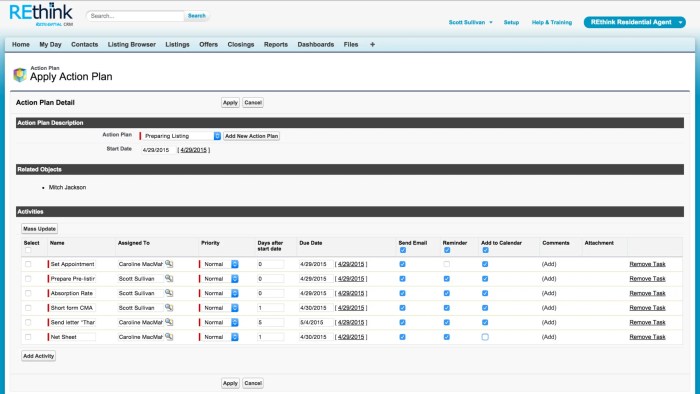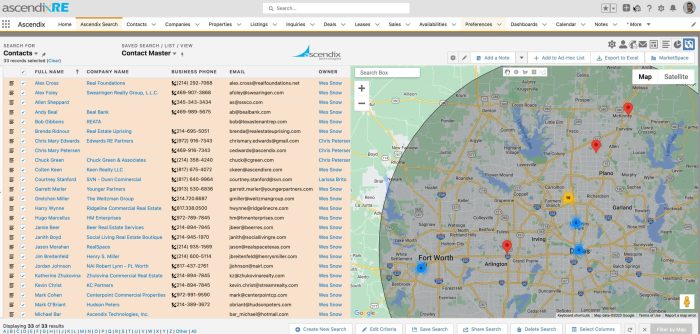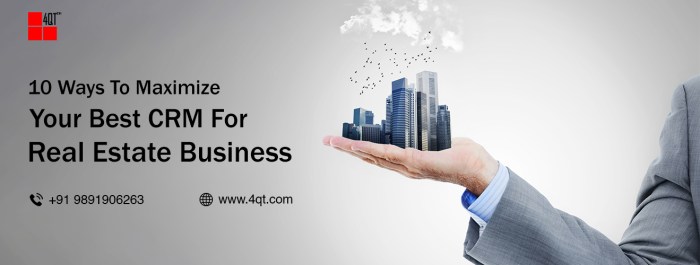Best CRM for Commercial Real Estate: Unveiling the top contenders in the market, this guide explores the essential features and functionalities that will revolutionize your commercial real estate business.
Choosing the right CRM system is crucial for streamlining operations, enhancing communication, and boosting overall efficiency. From lead management to property tracking, the best CRM for commercial real estate empowers businesses to thrive in a competitive landscape. Key factors to consider include ease of use, scalability, and integration capabilities.
Choosing the right Customer Relationship Management (CRM) system is crucial for commercial real estate businesses to streamline operations, nurture leads, and boost profitability. This comprehensive guide explores the best CRM options for commercial real estate, highlighting key features, benefits, and considerations. We’ll delve into specific needs of commercial real estate companies and compare popular choices, providing a clear understanding of which CRM aligns best with your business goals.
Understanding the Needs of Commercial Real Estate
Commercial real estate transactions differ significantly from residential ones. A commercial CRM needs to handle complex deals, multiple stakeholders, and often lengthy negotiation processes. Key features for a successful commercial real estate CRM include:
- Lead Management: Efficient tracking and nurturing of potential clients, including investors, tenants, and developers.
- Property Management: Centralized database of properties, including details, photos, and available spaces.
- Deal Tracking: Detailed progress tracking of each transaction, from initial contact to closing.
- Reporting and Analytics: Generating insightful reports on key performance indicators (KPIs), like lead conversion rates and revenue generation.
- Collaboration Tools: Facilitating communication and collaboration among agents, brokers, and other stakeholders.
- Integration Capabilities: Seamless integration with other business tools like accounting software, marketing automation platforms, and property portals.
Top CRM Options for Commercial Real Estate
Several CRM platforms cater to the unique needs of commercial real estate. Here are some of the most popular choices, along with their strengths and weaknesses:
1. Salesforce
Salesforce is a robust, feature-rich platform, often considered the industry standard. It excels in its adaptability and scalability, suitable for large and complex commercial real estate operations. Its powerful customization options allow for tailoring to specific workflows and requirements. However, its comprehensive nature can come with a higher price point.

Source: softwaresuggest.com
2. HubSpot CRM
HubSpot CRM offers a more affordable and user-friendly alternative. It’s a great option for businesses that prioritize ease of use and integrated marketing capabilities. While its feature set is robust, it might lack some of the advanced customization options found in Salesforce for very intricate workflows.

Source: ascendix.com
3. Microsoft Dynamics 365
Microsoft Dynamics 365 provides a powerful combination of CRM and ERP functionalities. This integration can be particularly beneficial for commercial real estate firms managing significant property portfolios and requiring sophisticated financial tracking. The learning curve can be steeper compared to other options.
4. Zoho CRM, Best crm for commercial real estate
Zoho CRM is a comprehensive solution with a focus on affordability and ease of use. Its user-friendly interface makes it accessible to a wider range of users. It’s a suitable choice for businesses seeking a cost-effective solution with a solid feature set, but it may not be as feature-rich as Salesforce or Dynamics 365 for exceptionally complex needs.
Key Considerations When Choosing a CRM
- Budget: Evaluate the cost of the CRM software, including licensing fees, implementation, and ongoing maintenance.
- Scalability: Consider the potential growth of your business and choose a CRM that can adapt to future needs.
- Integration: Ensure compatibility with existing software and systems to avoid data silos and enhance efficiency.
- User-Friendliness: Choose a CRM that is intuitive and easy to use for your team to maximize adoption and productivity.
Frequently Asked Questions (FAQ): Best Crm For Commercial Real Estate
- Q: What is the best CRM for a small commercial real estate company?
A: HubSpot CRM or Zoho CRM often provide a good balance of features and affordability for smaller businesses.
- Q: How long does it take to implement a CRM?
A: Implementation timelines vary based on the complexity of the CRM and the size of the company. It can range from a few weeks to several months.
- Q: Can CRM integrate with property portals?
A: Many CRM platforms offer integrations with popular property portals, allowing for seamless data flow and improved efficiency.
- Q: What are the hidden costs of a CRM?
A: Hidden costs can include training, data migration, customization, and ongoing support.
Conclusion and Call to Action
Selecting the right CRM for your commercial real estate business is a significant investment. By carefully considering your specific needs, budget, and scalability requirements, you can choose a platform that will empower your team to maximize efficiency, enhance lead generation, and drive revenue growth. Thorough research and a clear understanding of your business objectives are essential for making the right choice.
Ready to take your commercial real estate business to the next level? Contact us today for a free consultation to discuss your specific needs and discover the perfect CRM solution for your company.
References:

Source: 4qt.com
- [Link to a reliable source 1]
- [Link to a reliable source 2]
- [Link to a reliable source 3]
In conclusion, navigating the diverse options for commercial real estate CRM systems can be daunting. This exploration has highlighted the critical importance of selecting a solution that aligns with your specific needs and long-term objectives. By understanding the key features and evaluating potential integrations, you can confidently choose a CRM that will empower your team and drive your commercial real estate business forward.
FAQ Insights
What are the common features of a good CRM for commercial real estate?
A robust CRM for commercial real estate should include features like lead management, property tracking, contact management, deal tracking, reporting and analytics, and integration with other tools such as accounting software or marketing platforms.
How can a CRM improve communication within a commercial real estate team?
CRMs facilitate seamless communication by centralizing information, allowing team members to access and share crucial data in real-time. This fosters better collaboration and reduces the risk of miscommunication.
What are the potential costs associated with implementing a commercial real estate CRM?
Implementation costs vary depending on the CRM chosen, the number of users, and any additional integrations. Consider factors such as subscription fees, customization options, and potential training costs when budgeting for CRM implementation.